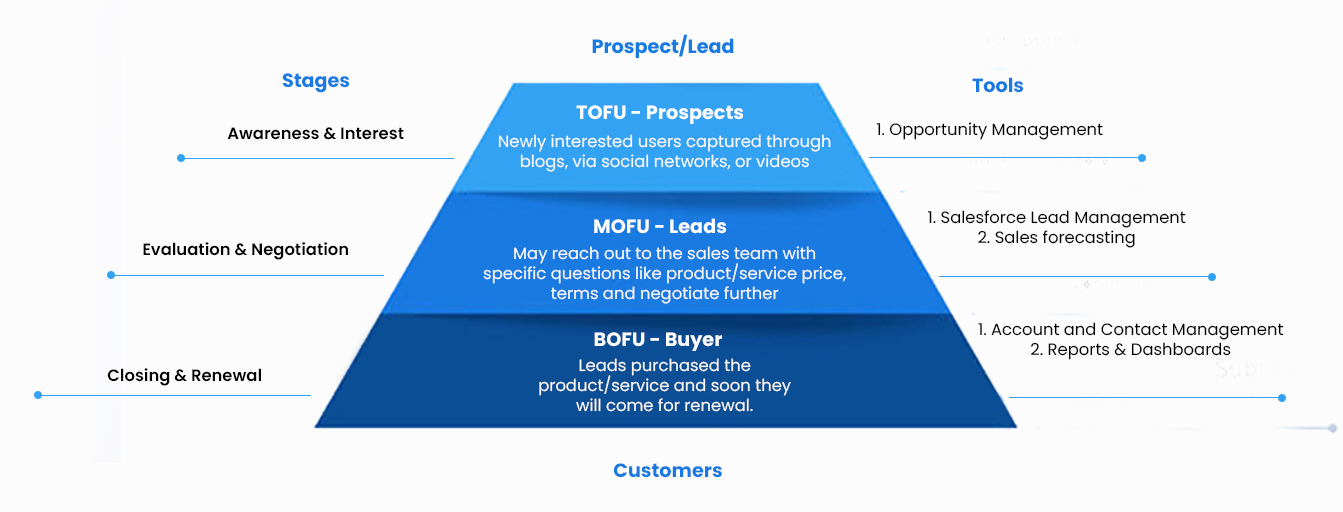
Salesforce Sales Cloud: Empowering Sales Teams to Drive Results
Salesforce Sales Cloud finds the appropriate balance between increasing sales efficiency and providing better customer service by gathering information about potential leads, supporting sales professionals in personalizing their interactions with them at every stage of the customer journey, and more.
Introducing Salesforce Sales Cloud
What makes Salesforce Sales Cloud worth your money?
- You learn a lot about your clients from every click, exploration, product put into the cart, past purchasing data, and other interactions.
- Bring your sales and marketing departments together to work on customer service and client retention tactics.
- Identify your sales performance forecast and develop a pertinent sales strategy.
- Give your sales and customer care representatives the tools they need to view customers’ information holistically and provide an integrated experience.
- Capture more leads by automating lead entry and nurturing them with personalization.
- Gain a unified outlook of your sales funnel to close more business.
- Improve Salesforce sales efficiency by analysing and tracking competitors in order to deliver a more effective message.
- Automate business operations to save sales representatives time and increase the effectiveness of your sales workflow.
Typical sales rep pain points and how Salesforce Sales Cloud addresses them:
Pain Points of Sales Representative
Salesforce Sales Cloud’s relevance
Lead submission and allocation automation
When sales receive a new lead, they spend an average of six minutes processing the information and assigning it to the appropriate representative. Initial data entering takes 3 minutes. Since this procedure must be performed for all new prospects, it impacts the productivity and workflow of the sales team.
You can automate this process with Salesforce Sales Cloud, which makes you 50% more productive. With the web-to-lead feature of sales cloud, all incoming leads are automatically combined. This saves a lot of time, which can now be used to improve the sales process.
Improving the process of lead conversion
Without a comprehensive view of the lead, sales teams struggle to nurture them through efficient communication, assign them to the appropriate stage of the sales funnel, and convert them into customers.
Salesforce’s web-to-lead feature enables sales teams to quickly read information about a lead via ‘lead list view’; assign lead scores to prospects to connect with them based on set priorities; obtain information on the total number of incoming leads, the date of generation, and the status; and request follow-ups from sales reps assigned the respective leads via ‘Chatter’.
In addition, you receive visibility into the performance of your Salesforce sales funnel on the dashboard, the ROI of your marketing expenditures, and make data-driven decisions.
Convert more leads into sales and attract more clients.
Without 360-degree visibility into the sales pipeline, it is difficult for sales teams to distinguish between prospects that are close to conversion and those that require additional nurturing. Due to the absence of a platform for analysing competition information, sales representatives are unaware of why customers choose the products/services of their competitors. It ultimately affects their final sales figures and impedes business expansion.
On Salesforce Sales Cloud’s dashboard, you can access every detail about your prospects, leads, and customers. With tools such as ‘My Stuck Opportunities,’ ‘Know Your Competitors,’ and ‘Opportunity Closed Lost Reason,’ sales representatives are able to gain a comprehensive understanding of lead behaviour, follow competition, discover opportunities for growth, and prepare effectively
Reducing sales rep orientation
Most days, sales representatives spend their time managing manual processes, which hinders their productivity and creative development.
By automating manual procedures, Salesforce Sales Cloud increases the productivity of your sales staff. It enables representatives to connect with product/service specialists and counsel with them on how to market solutions and onboard additional clients. Reps may rapidly access all integrated information on a single dashboard to increase their visibility. Reps can check the Open Opportunity and Closed Won Opportunity scores for an account using “roll up summary fields.”
Once a lead is won and the sales funnel stage is moved to “closed won” in Salesforce, its status automatically switches to Customer. Salesforce automatically delivers thank you emails and materials for client onboarding to sponsors.
Convert more leads into sales and attract more clients.
Frequently, sales leaders fail to determine which assets are underutilised and which colleagues can close deals more quickly. This results in greater personnel turnover costs, as expectations are ambiguous and lack direction.
Salesforce Sales Cloud enables sales leaders to monitor rep progress and provide them with real-time guidance on their next steps. It equips new sales hires with the necessary information, establishes reasonable goals, and allows consistent communication through a Chatter group.
How does Salesforce Sales Cloud impact the sales funnel?

Competitive Salesforce Sales Cloud solutions that increase sales effectiveness:
- Automation through Sales Cloud: Automation in Salesforce Sales Cloud reduces low-value, repetitive processes, allowing salespeople to concentrate on selling rather than administrative work. The Salesforce Sales Cloud provides you with a real-time view of your clients, including the automated capture of new contacts from email, activity history, critical contacts, and continuing interactions. This increases the amount of calls and emails a team may make to enhance process and workplace efficiency.
- Salesforce Billing & CPQ: A customer’s journey has many points where they interact with a company. For example, the marketing team could send personalised messages, salespeople could call accounts, and finance professionals could help with quoting and billing. With Salesforce CPQ and billing, you can change your business model from one-time product sales to ongoing relationships with customers. This makes it easier for sales reps to choose the right products and services for customers. The CPQ and billing process gets rid of the need to recalculate and duplicate data, which speeds up the flow of data. Salesforce CPQ and Billing work together to make invoices, payments, and records of revenue. With Salesforce Sales Cloud, you can do all of your configuration, pricing, quoting, billing, and payment collection on a single platform. When CPQ and billing are tied together, you can do the following:
- Generate error-free bills.
- Make it easier for subscribers to pay their bills
- Improve sales performance.
- Improve your relationships with customers.
- Management of Sales Cloud Partner Relationships: 75% of the world’s trade is conducted through indirect channels, such as partners and franchises. Companies rely on sales representatives to obtain, acquire, and serve consumers. Equally crucial is how salespeople engage with clients, as it reflects your brand. They must be given the tools necessary to become trustworthy consultants. Here comes Partner Relationship Management for the Sales Cloud, which:
- Salesforce’s interactive wizard simplifies onboarding, recruiting, training, and assisting your salespeople with features such as establishing lead distribution, deal registration, and marketing development funds.
- Provides the data they need to close sales and increase their efficiency.
- Salesforce PRM (Partner Relationship Management) provides performance analytics across devices and channels to help track KPIs and discover cross-selling and up-selling possibilities.
- Prebuilt PRM systems prevent lead conflicts, automate lead distribution, register deals, and more.
- Einstein Analytics for Sales Cloud: Every firm must acquire leads, create lead pipelines, track, and manage opportunities, close transactions more quickly, manage customer connections post-sales, and monitor sales force effectiveness. Salesforce provides a solution driven by AI called Sales Cloud Einstein for monitoring all these activities. Einstein provides you with all the insights and data necessary to stay abreast of business changes and other significant events affecting your client relationships. With the adoption of Salesforce Einstein, brands receive email content suggestions, engagement ratings, etc. Sales Cloud Einstein improves efficiency and decision-making with AI and automation by:
- Accelerating pipeline construction with Einstein Lead Scoring
- Einstein identifies customer mood, competitor participation, and overall prospect engagement. Prospective Insights
- Einstein Activity Capture eliminates data entering by hand and saves time.
- Using Einstein Account Insights to improve connections.
- Engagement with Salesforce Marketing Account: The expectation of merchants is for marketers and salespeople to engage customers with customized material. Marketing automation is recommended because manual execution is arduous. Marketing automation integrates the marketing and sales departments to increase the efficiency of sales. Here are several ways in which your company might profit from Salesforce Marketing Account Engagement:
- Attract and produce qualified prospects.
- Obtain alerts in real-time of prospect activity during sales conversations.
- Create better relationships through personalized outreach.
- Utilizing Salesforce Customer Segmentation, create targeted cam.
